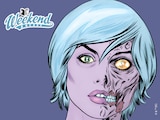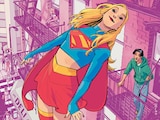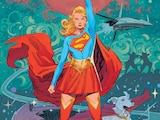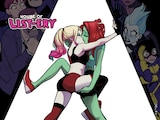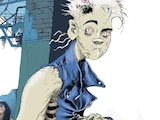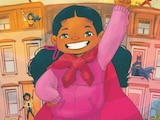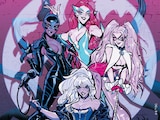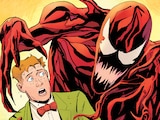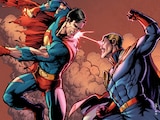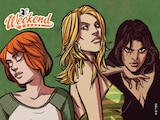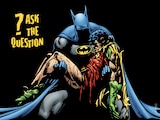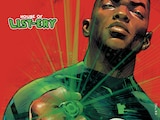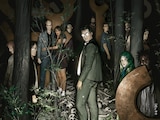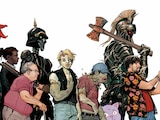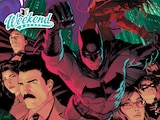The bogeyman. The monster in the closet. The things that go bump in the night. They show up, sometimes, in a good spooky story. But what gives us nightmares, what really keeps us up late at night, can't always be named. With Halloween just around the corner, we sent thirteen questions about horror to some of the smartest writers in the comic book industry to get to the heart of why we love horror. Scott Snyder, Joshua Hale Fialkov, Dan Abnett and Andy Lanning are all currently writing characters traditionally associated with horror. Paul Cornell's writing a dark fantasy book chock full of fear and the supernatural. Brian Azzarello, J. H. Williams III and W. Haden Blackman are injecting horror into superhero epics. They all took time out to share their thoughts on what we're calling the New Horror in DC COMICS-THE NEW 52. Their answers will run here on the SOURCE in three parts, but you can keep the conversation going on Twitter with the hashtag #thenewhorror. On Horror For the last decade, our culture is overrun by creatures of the night and the undead. Why is the horror genre currently so popular? JOSHUA HALE FIALKOV (I, VAMPIRE): Horror has been a part of our culture from the dawn of time. But, it especially pops up during times of drastic change... from the Victorian era to the Depression to the Watergate era, and, yes, even the 80s. And horror always reflects the secret fears of the world around us. There's a reason that a society of sex and consumerism is so fascinated with Vampires and Zombies right now. BRIAN AZZARELLO (WONDER WOMAN): In post-modern times, we like to be distracted from what's really frightening.
DAN ABNETT (RESURRECTION MAN): There is an inherent strand of dark romance running through horror that is often lacking from, say, science-fiction. Science-fiction generally deals in wonder and scale, but horror is almost always personal. It’s about loss, emotion, melancholy. Plus, if we proved tomorrow that the world of the supernatural existed, nobody would be very surprised. Its appeal lies in the notion that it’s just a step away us in the shadows, and it’s been there all the time. W. HADEN BLACKMAN (BATWOMAN): I don't think horror has ever stopped being popular. The genre ebbs and flows like anything else, with different types of horror taking center stage at different times, but every decade has its big horror franchises and best sellers. Today, I think horror allows us to test ourselves in a "safe" environment -- we know that we won't ever really encounter a ghost who drowns children or a shape-shifting alien in the arctic, but we can brave the fictional versions and get a small glimpse of what it might be like to meet the real thing. And "surviving" that experience gives us a rush that is difficult to come by in our often protected and ordinary lives. J.H. WILLIAMS III (BATWOMAN): I feel that horror really hasn't been unpopular, but does move to the mainstream in times of cultural or societal crisis. It's a powerful form of escapism that allows you to experience something beyond the troubles in one's own life, it subconsciously can give perspective to real life, by giving form to real emotions through prompted fears that we suppress otherwise. Through horror genres, we allow ourselves to manifest what is deeply in our subconscious minds. We can face down our darkest thoughts without judgments. PAUL CORNELL (DEMON KNIGHTS): Because we live in troubled and fearful times. Actually, being human, we always live in troubled and fearful times. That's why there's never been a time, in cinema, where it's a thrill ride and you can scream out loud, when horror wasn't popular. Stephen King apart, though, the genre isn't doing well right now in terms of prose. That's because we live in troubled and fearful times. ANDY LANNING (RESURRECTION MAN): Horror always seems to be most popular when times are at their bleakest. It’s always reassuring to watch a parade of monsters and ghouls and people doing terrible things to each over on the screen or in a book then return to the relative safety of your own home. It makes the real horror in the world easier to deal with. SCOTT SNYDER (SWAMP THING, BATMAN, AMERICAN VAMPIRE): I think it's always popular, people just notice it when at different moments, when there happen to be waves of things about one particular monster. Why do we like to be scared? J.H. WILLIAMS III: I think it’s a very primal thing. To be scared or startled releases chemicals in our bodies, like a drug. Therefore providing a thrill, or an elevated sense of self. Unless we do something truly dangerous, we don't get to experience these profound chemicals any other way than through our imaginations being triggered by horrific concepts presented to us.
BRIAN AZZARELLO: The fear of death makes us feel alive.
ANDY LANNING: It’s a rush, a thrill ride that’s totally safe.
W. HADEN BLACKMAN: For me personally, it provides a rush akin to sky diving or driving really, really fast.
PAUL CORNELL: We like to be scared and for it then to be okay. They say laughter evolved from a hunting call of 'phew, it's all right.' The pleasure for us is in the relief.
SCOTT SNYDER: As to why, I think scary things are a way for us to deal with our real world fears in a way that's manageable. Good horror movies have the heroes facing their worst fears, manifested as monsters or serial killers. And by facing them in the form of Jason or a haunted house, it makes us feel more in control (at least for the couple hours it takes to watch or read something scary).
JOSHUA HALE FIALKOV: Because it makes the real pains of life so much less upsetting. We need it because it's something we can conquer in the way our real lives just can't be.
DAN ABNETT: It’s a thrill. It allows us to experience some of those primal responses that we don’t feel as much in modern life.
If monsters are commonplace, is horror still scary?
BRIAN AZZARELLO: No -- but it's thrilling. And that feeling shouldn't be discounted.
JOSHUA HALE FIALKOV: The monsters are never the scary part, it's the consequences, so as long as the stakes are kept real, horror will always work.
J.H. WILLIAMS III: Monsters in some way represent distortions or grotesque ideals of humanity. They symbolize inner thoughts or ideas that we all may think about, but rarely voice. This is why they will always remain scary, because we can see our twisted darker sides in them, things that we all feel under the surface from time to time.
ANDY LANNING: There will always be a new bogeyman, even if the world were full of monsters, there would be something out there that would scare people, even the monsters are afraid of something. Probably Tickle Me Elmo.
PAUL CORNELL: Are monsters commonplace? If it's commonplace, it's not a monster.
W. HADEN BLACKMAN: I see "monsters" as only one part of the entire horror landscape, and it's clear that even monsters can still be scary - especially when they are reinvented to feel familiar but new. We have primal fears that these monsters represent -- fear of death, fear of strangers, fear of aging, fear of disease -- and as long as those fears are still hardwired into our brains on some level, the monsters that embody these fears will remain scary.
SCOTT SNYDER: Of course! Monsters are commonplace because they're enduringly scary.
J.H. WILLIAMS III: I think it’s a very primal thing. To be scared or startled releases chemicals in our bodies, like a drug. Therefore providing a thrill, or an elevated sense of self. Unless we do something truly dangerous, we don't get to experience these profound chemicals any other way than through our imaginations being triggered by horrific concepts presented to us.
BRIAN AZZARELLO: The fear of death makes us feel alive.
ANDY LANNING: It’s a rush, a thrill ride that’s totally safe.
W. HADEN BLACKMAN: For me personally, it provides a rush akin to sky diving or driving really, really fast.
PAUL CORNELL: We like to be scared and for it then to be okay. They say laughter evolved from a hunting call of 'phew, it's all right.' The pleasure for us is in the relief.
SCOTT SNYDER: As to why, I think scary things are a way for us to deal with our real world fears in a way that's manageable. Good horror movies have the heroes facing their worst fears, manifested as monsters or serial killers. And by facing them in the form of Jason or a haunted house, it makes us feel more in control (at least for the couple hours it takes to watch or read something scary).
JOSHUA HALE FIALKOV: Because it makes the real pains of life so much less upsetting. We need it because it's something we can conquer in the way our real lives just can't be.
DAN ABNETT: It’s a thrill. It allows us to experience some of those primal responses that we don’t feel as much in modern life.
If monsters are commonplace, is horror still scary?
BRIAN AZZARELLO: No -- but it's thrilling. And that feeling shouldn't be discounted.
JOSHUA HALE FIALKOV: The monsters are never the scary part, it's the consequences, so as long as the stakes are kept real, horror will always work.
J.H. WILLIAMS III: Monsters in some way represent distortions or grotesque ideals of humanity. They symbolize inner thoughts or ideas that we all may think about, but rarely voice. This is why they will always remain scary, because we can see our twisted darker sides in them, things that we all feel under the surface from time to time.
ANDY LANNING: There will always be a new bogeyman, even if the world were full of monsters, there would be something out there that would scare people, even the monsters are afraid of something. Probably Tickle Me Elmo.
PAUL CORNELL: Are monsters commonplace? If it's commonplace, it's not a monster.
W. HADEN BLACKMAN: I see "monsters" as only one part of the entire horror landscape, and it's clear that even monsters can still be scary - especially when they are reinvented to feel familiar but new. We have primal fears that these monsters represent -- fear of death, fear of strangers, fear of aging, fear of disease -- and as long as those fears are still hardwired into our brains on some level, the monsters that embody these fears will remain scary.
SCOTT SNYDER: Of course! Monsters are commonplace because they're enduringly scary.
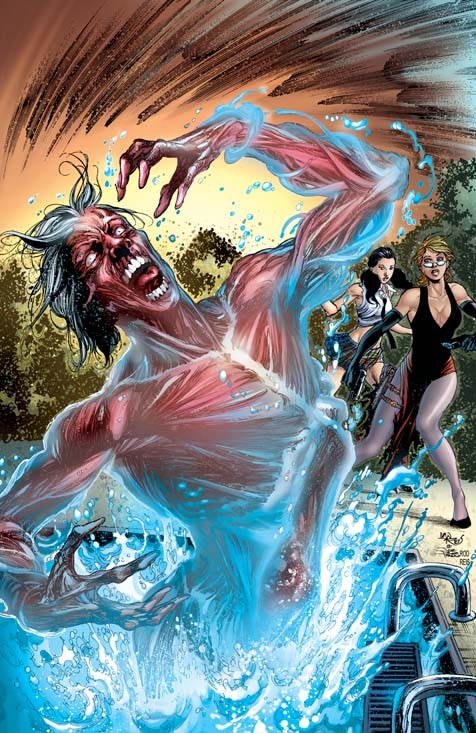 DAN ABNETT: I think horror is still scary, but I think scary is (and always was) better than horrible. The best scares have nothing to do with obvious blood and gore.
Vampires or zombies? What’s your favorite creature?
SCOTT SNYDER: I write AMERICAN VAMPIRE. Do you have to ask?
ANDY LANNING: Vambies or Zompires. I love em both!
J.H. WILLIAMS III: I have to base my choice on what I find scarier. As vile as Vampires can be portrayed, I have to go with Zombies. It boils down to rationality for me. Vampire motivations can be explained with understandable reasons for their behavior, on why we should fear them. But it is very much sort of a food chain construct, they're higher up on it than us. They have emotions and needs relatable to human ones, so they can be rationalized. Where Zombies are a totally insane concept. There is no rational thought to them, just relentless eating, unfeeling things that seem to serve no real intelligent purpose, just overwhelming and futile. They represent total loss of all relatable human ideas, complete grotesque annihilation. There is no explaining them properly, their motivation is completely alien, and there is no wrapping your head around it. The unknown is a powerful thing in creating total panic and fear.
PAUL CORNELL: Vampires. I'm bored with zombies. And as Jane Austen once said, who could ever be tired of vampires?
DAN ABNETT: Uhm, the one that’s gonna save me from the vampires and the zombies?
W. HADEN BLACKMAN: It depends... Are we talking about the tragic, misunderstood vampire who just wants to be good; or the moody, angst-ridden vampire; or the vicious, narcissistic and murderous blood sucker? The shambling Voodoo zombie; or the ravenous flesh eater; or the super-strong, invulnerable zombie? To me, one of the coolest things about these archetypes is that they can be continually reinvented.
JOSHUA HALE FIALKOV: As a native Pittsburgher (better known as the land of George Romero), my gut tells me Zombies, but, considering the world we live in, and how much fun I'm having writing I, VAMPIRE’s Andrew and Mary, I'm going Vampire.
DAN ABNETT: I think horror is still scary, but I think scary is (and always was) better than horrible. The best scares have nothing to do with obvious blood and gore.
Vampires or zombies? What’s your favorite creature?
SCOTT SNYDER: I write AMERICAN VAMPIRE. Do you have to ask?
ANDY LANNING: Vambies or Zompires. I love em both!
J.H. WILLIAMS III: I have to base my choice on what I find scarier. As vile as Vampires can be portrayed, I have to go with Zombies. It boils down to rationality for me. Vampire motivations can be explained with understandable reasons for their behavior, on why we should fear them. But it is very much sort of a food chain construct, they're higher up on it than us. They have emotions and needs relatable to human ones, so they can be rationalized. Where Zombies are a totally insane concept. There is no rational thought to them, just relentless eating, unfeeling things that seem to serve no real intelligent purpose, just overwhelming and futile. They represent total loss of all relatable human ideas, complete grotesque annihilation. There is no explaining them properly, their motivation is completely alien, and there is no wrapping your head around it. The unknown is a powerful thing in creating total panic and fear.
PAUL CORNELL: Vampires. I'm bored with zombies. And as Jane Austen once said, who could ever be tired of vampires?
DAN ABNETT: Uhm, the one that’s gonna save me from the vampires and the zombies?
W. HADEN BLACKMAN: It depends... Are we talking about the tragic, misunderstood vampire who just wants to be good; or the moody, angst-ridden vampire; or the vicious, narcissistic and murderous blood sucker? The shambling Voodoo zombie; or the ravenous flesh eater; or the super-strong, invulnerable zombie? To me, one of the coolest things about these archetypes is that they can be continually reinvented.
JOSHUA HALE FIALKOV: As a native Pittsburgher (better known as the land of George Romero), my gut tells me Zombies, but, considering the world we live in, and how much fun I'm having writing I, VAMPIRE’s Andrew and Mary, I'm going Vampire.


